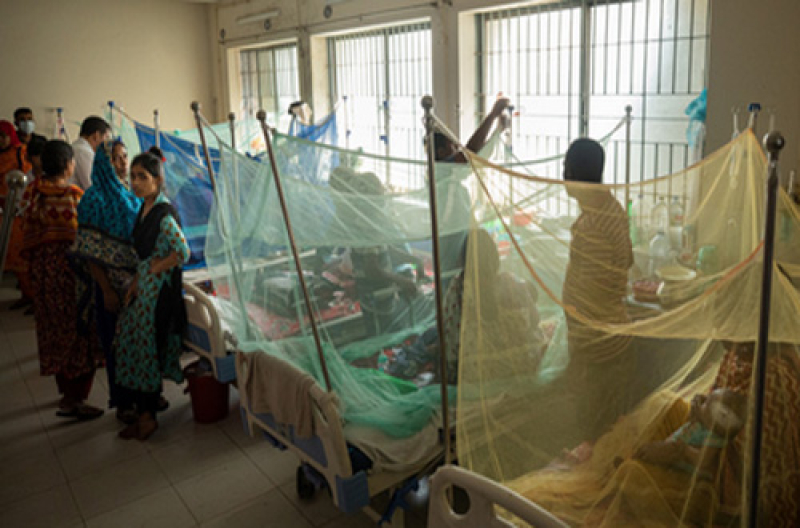- Power transfer, start of new journey for democracy: Prof Yunus |
- NCP Leaders Sign July National Charter in Dhaka |
- Tarique Rahman Vacates Bogura-6 Seat After Dual Win |
- Newly Elected MPs, Cabinet Members to Take Oath Tomorrow |
- India beats Pakistan by 61 runs as World Cup scenario heats up |
Dengue outbreak to continue

There is no scope for the authorities to lose focus on mosquito control activities.
While the country is already grappling with its worst dengue outbreak recorded, the current rainfall due to cyclone Midhili is likely to see the outbreak linger even longer, according to experts.
This year's dengue situation showed signs of some improvement since last month with the approach of winter. The rainfall, however, poses a threat to worsen the situation again as it will provide new breeding grounds for Aedes mosquitoes.
The country is facing moderate to heavy rainfall due to cyclone Midhili. Highest 176mm rainfall was recorded in Bhola, while Dhaka faced 13mm rainfall till 3:00pm Friday, said meteorologist Kazi Jebunnesa.
There is no scope for the authorities to lose focus on mosquito control activities due to the upcoming national election.
Meanwhile, 11 people died and 956 others were hospitalised in the last 24 hours till Friday morning. With the deaths and new cases reported, the total number of dengue deaths rose to 1,539 and total cases 2,99,050 this year, according to the Directorate General of Health Services.
"Mosquitoes remain alive for around 40 days. During this time, if they don't get water, as happens during winter, they would die without being able to lay eggs. But the rains mean mosquitoes will now get water to lay eggs, which in turn will cause the outbreak to linger further for 40 to 50 days," said Kabirul Bashar, an entomologist at Jahangirnagar University.
The rain will provide breeding grounds for mosquitoes, he said, adding that it is very important to destroy all possible breeding grounds and authorities concerned must take necessary actions in this regard.
GM Saifur Rahman, an entomologist at National University, Bangladesh, said they were assuming a reduction of mosquito breeding in November; however, this rain will increase further breeding.
With winter approaching, the season of culex mosquitoes has started, so authorities concerned will turn their attention to controlling culex mosquitoes. But they will have to keep their focus on Aedes mosquitoes as well, especially outside Dhaka, he said.
There is no scope for the authorities to lose focus on mosquito control activities due to the upcoming national election, he added.
Saifur also said, "Dhaka city residents may develop herd immunity against dengue due to the large number of people infected since 2000. However, the chances of cases increasing outside the capital remain high."
"If Aedes mosquito population is not controlled, there is a risk that a large number of eggs will be laid by the mosquitoes which might be hatched next season and lead to another outbreak."
During the lean period of dengue (November to April), the authorities need to identify active clusters and continue to carry out extensive drives, including source reduction and use of larvicide and insecticide, until the reproductive chain of Aedes mosquitoes is broken, he said.

